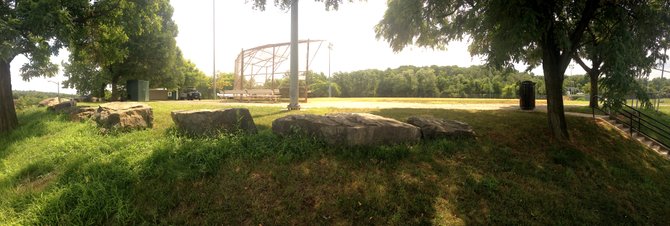Joseph Hensley Park was developed in part with federal money from the Land and Water Conservation Act, which means it was protected from development despite a determination last week from the city attorney. Photo by Michael Lee Pope.
Recently unearthed documents from city and state archives show Joseph Hensley Park is protected by the Land and Water Conservation Act, which financed development of the city-owned property in the late 1970s. As a result, the St. James Group announced this week that it's "disappointed to announce" that it will be withdrawing its proposal to use public land for private gain. The developments come a week after City Attorney James Banks concluded that the Land and Water Conservation Act funding from the 1970s "no impediment" to entering into a 40-year lease with the developer.
"We did not miss anything," said Banks. "What happened was we based the conclusion on the evidence that was in front of us, and we continued to search the records."
Even after Banks made his determination giving the green light to develop the city park, state officials at the Virginia Department of Conservation and Recreation said they were still trying to track down documents to determine how and where a 1977 grant was allocated. The search concluded that a 1977 grant assisted the city with the acquisition of a property known as the Lynch tract. That means the developer did, in fact, face an impediment despite what the city manager said last week.
"The requirements of the Land and Water Conservation Fund Act constitute a barrier of sufficient magnitude to the development of Hensley Park that [the St. James Group] has determined that the best course of action is to pursue other locations for its proposed sports and entertainment complex," according to a written statement issued Tuesday night.
EVER SINCE the St. James Group first submitted its unsolicited bid to the city last month, the proposal has been a polarizing topic. Some parents loved the idea of having a world-class sports complex with an Olympic-size pool and international squash courts. Advocates for open space worried that city officials were willing to hand over one of the city's crown jewels. Caught in the middle were elected officials responsible for making decisions based on legal analysis from the city attorney.
"We have to have a city attorney who does the work and does the job," said Jack Sullivan, who lives in Seminary Hill. "The guy seems to only want to sue our citizens and doesn't do the job he's been sent to do."
When the Board of Zoning Appeals ruled in favor of a group of citizens challenging the waterfront plan, Banks appealed the ruling. He later concluded that the board did not need legal representation in court, a determination that many critics of the waterfront plan said was unacceptable. Now that Banks has revised his opinion about Hensley Park, critics of city government say the management of City Hall has serious problems that must be addressed.
"The city attorney engages in wishful thinking and decides things the way he wants them to be rather than researching all the law and precedents," said Katy Cannady, a frequent critic of City Hall. "That gets you mistakes, and it gets you sued."
BANKS SAID part of the problem was the inaccessible nature of the documents and the changing landscape of the environment. When the land was originally acquired using the power of eminent domain in the 1970s, it was known as the Lynch tract because the city paid $580,000 to Edwin Lynch, who was acting as a trustee for a partnership known as Vernon M. Lynch and Sons. Then it was part of Cameron Run Park. It didn't become known as Hensley Park until after Joseph Hensley, the longtime director of the Department of Recreation and Cultural Affairs, retired in 1987. Meanwhile, the construction of Eisenhower Avenue added a challenge to comparing modern maps to the 1970s-era maps.
"The records in city archives are not maintained on site, and therefore it takes some time to recover those documents in a form in which they can be read, digested and analyzed," said Banks. "I provided analysis based on the information that we had in front of us, and we continued to search the records."
Vice Mayor Allison Silberberg said she's glad public land was not used for private gain, adding that the changing legal analysis on Hensley Park should be an opportunity to have a conversation about better management.
"This is a teachable moment for the city and staff, for all of us, to ensure that we have all the facts before we speak and not rush to judgement," said Vice Mayor Allison Silberberg. "We need to hold ourselves accountable."
